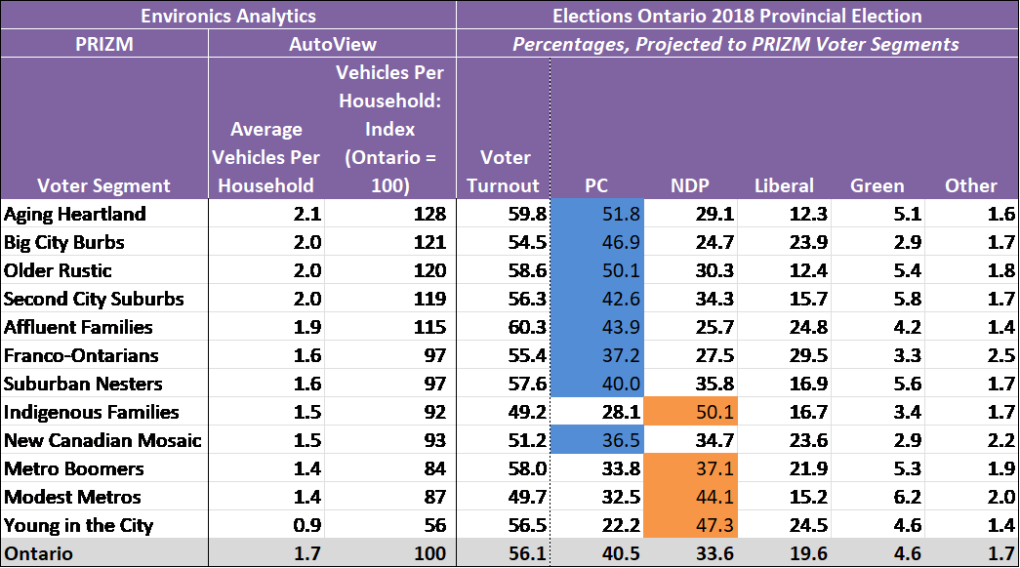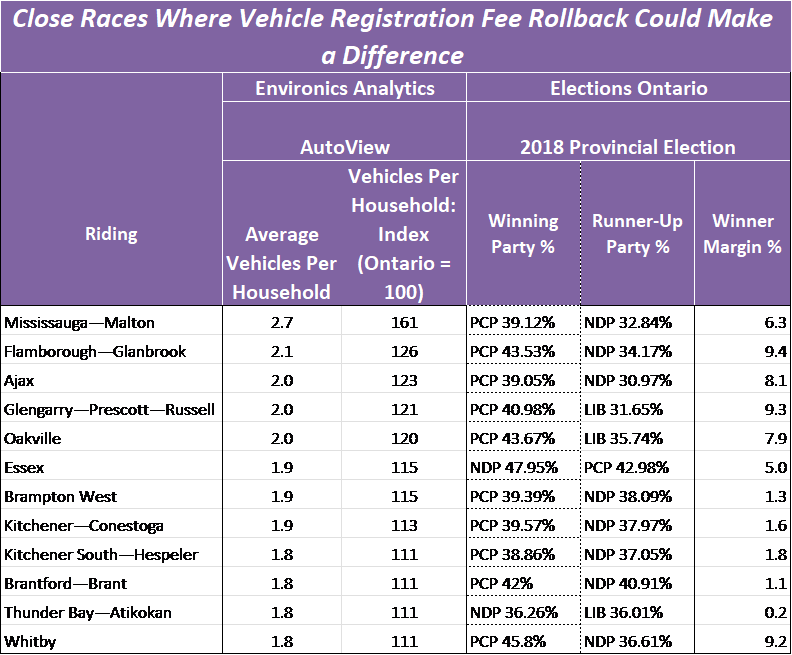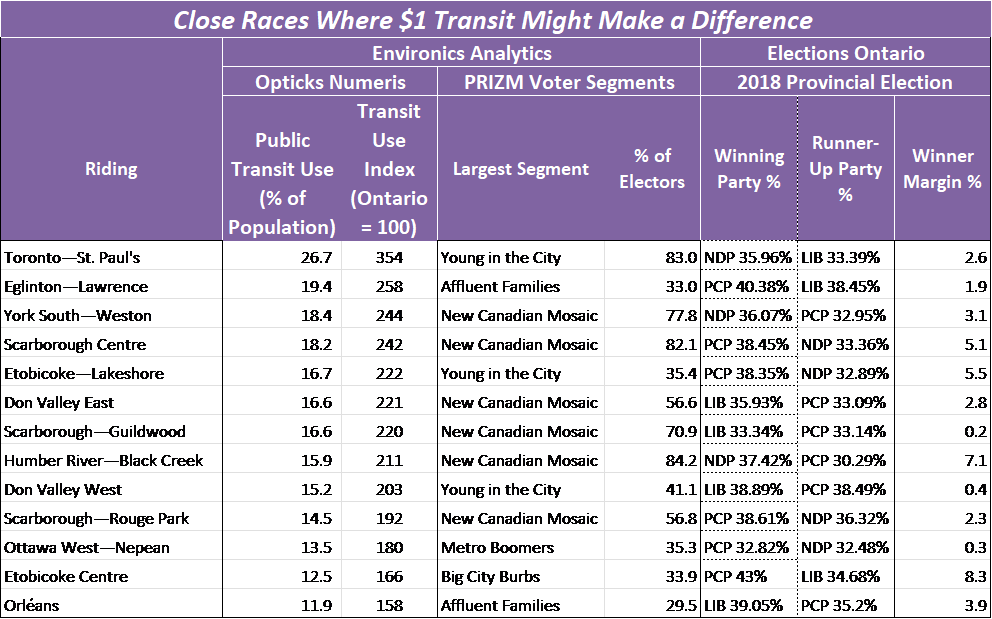Which Ontario voters are impacted by the licence plate renewal rebates?
The provincial government’s decision to scrap vehicle registration renewal fees in Ontario greatly benefits drivers living in ridings that mostly voted for the Progressive Conservatives in 2018, data suggests.
There are five voter groups with vehicle ownership rates above the provincial average—which stands at 1.7 per household. According to data by Environics Analytics, those five groups tend to favour the PCs.
“This initiative especially benefits Ontarians with higher rates of vehicle ownership because they would receive a larger refund cheque or savings on fees payable in the future,” Rupen Seoni, senior vice president of Environics Analytics, told CTV News Toronto.
“The segments that have the highest vehicle ownership also voted decisively PC.”
The voting groups are primarily made of a mix of suburban families, older couples and affluent city families.
 This table shows the average vehicle owned per household, divided into Ontario voter segments. (Environics Analytics)
This table shows the average vehicle owned per household, divided into Ontario voter segments. (Environics Analytics)
The Ontario government scrapped licence plate renewal and sticker fees for passenger vehicles, light duty trucks, motorcycles and mopeds as of March 13. Drivers who paid the fees after March 1, 2020 are entitled to a refund under this policy.
The measure will save many Ontario drivers up to $120 a year.
The Ontario's Financial Accountability Officer said the fees brought in $1.95 billion in revenue for the government in 2018-2019.
Neither the NDP, Liberals or Green Party have said they would reinstate renewal fees; however since the PCs were the party to introduce the measure, Seoni said it could give them an advantage.
“We find 12 ridings where the refund could help re-elect PC MPPs that won on thin margins or help overturn an incumbent from another party that squeaked out a win last time,” Seoni said.
“All were won by the PCs in 2018, except for two by the NDP. Most are in the GTA and southwestern Ontario.”
In all the ridings, the average vehicle ownership per household is also above the provincial average.
 These ridings could be swayed by the licence plate renewal fee rebates. (Environics Analytics)
These ridings could be swayed by the licence plate renewal fee rebates. (Environics Analytics)
On the other side, the proposed “buck-a-ride” plan put forward by the Ontario Liberal Party could help them reclaim some ridings that previously voted NDP.
“Politically speaking, the most important segments to the Liberals who would benefit from this policy is Young in the City (who voted strongly for the NDP in 2018) and New Canadian Mosaic (who swung to the PCs and NDP in almost equal measures),” Seoni said. “These are two groups that could – and have – voted Liberal in the past. This policy could help them win some votes back.”
- EXPLAINER: Who are the voter segments?
Seoni says there are 13 ridings where the rate of public transit use is at least 50 per cent above the provincial average. Eleven of those ridings are in Toronto while the remaining two are in Ottawa.
“Considering the Liberals only had seven seats at dissolution of the legislature, it’s remarkable that four of them are in this list, and they won over the PCs by under four per cent every case, so these seats are critical for them.”
 Ontario ridings where voters use transit the most and where the Liberals' "buck-a-ride" policy may impact. (Environics Analytics).
Ontario ridings where voters use transit the most and where the Liberals' "buck-a-ride" policy may impact. (Environics Analytics).
Under the Liberal plan, all transit fares in Ontario—including GO Transit—would be reduced to $1 until 2024. It is unclear what will happen to the fares after this time frame.
The Liberals say this plan would cost about about $710 million in 2022-23.
The map below shows the ridings with the voter segments that drive the most and how they voted in 2018. It also shows where voters who spend the most on transportation and own the most cars live.
Can’t see the map? Click here.
View the full-screen version of this interactive map by Esri Canada with Environics Analytics data.
Environics Analytics and CTV News are both owned by BCE Inc.
CTVNews.ca Top Stories

W5 Investigates 'I never took part in beheadings': Canadian ISIS sniper has warning about future of terror group
An admitted Canadian ISIS sniper held in one of northeast Syria’s highest-security prisons has issued a stark warning about the potential resurgence of the terror group.
Trudeau talks border, trade in surprise dinner with Trump at Mar-a-Lago
Prime Minister Justin Trudeau discussed border security and trade during a surprise dinner with U.S.-president elect Donald Trump at Mar-a-Lago in West Palm Beach, Fla. on Friday evening, according to senior government sources.
Are scented candles bad for you? What the science says
Concerns about the safety of candles are rooted in the chemical reactions that occur when you burn them, as well as in the artificial fragrances and colorants that contribute to the various scents you may love.
From inside a Cameroon jail, gay youth say police exploit homophobia to seek bribes
Cameroon's penal code criminalizes 'sexual relations with a person of the same sex,' with a maximum sentence of five years in prison and a $450 fine.
'Absolutely been a success': Responders looks back at 988, Canada's Suicide Crisis Helpline, one year later
In its first year, responders for Canada's Suicide Crisis Helpline, known as 988, have answered more than 300,000 calls and texts in communities nationwide.
Postal workers union files unfair labour practice complaint over Canada Post layoffs
The union representing Canada Post workers has filed an unfair labour practice complaint with the Canada Industrial Relations Board over the layoffs of striking employees.
Face facts: Statues of stars like Kane and Ronaldo don't always deliver. Sculptors offer advice
One art critic compared the new Harry Kane bronze statue to a bulging-jawed comic strip character.
Magic can't save 'Harry Potter' star Rupert Grint from a US$2.3 million tax bill
Former 'Harry Potter' film actor Rupert Grint faces a 1.8 million-pound (US$2.3 million) bill after he lost a legal battle with the tax authorities.
Nova Scotia PC win linked to overall Liberal unpopularity: political scientist
Nova Scotia Premier Tim Houston is celebrating his second consecutive majority mandate after winning the 2024 provincial election with 43 seats, up from 34. According to political science professor Jeff MacLeod, it's not difficult to figure out what has happened to Liberals, not just in Nova Scotia but in other parts of Canada.


































